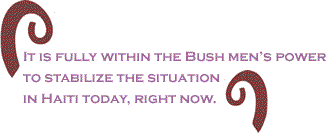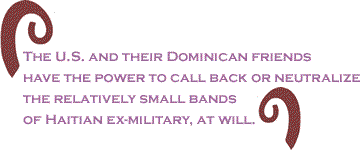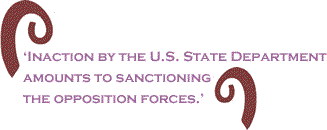
|
|||||||||||||||||||||
|
In willful ignorance and with every bad intention, the U.S. corporate media ask the ridiculous question, Should the US intervene in Haiti, or not? The bloody answer screams back from the Haitian mountains and cities: Washington has already intervened militarily in Haiti, through its surrogates’ armed invasion from the Dominican Republic. The Americans set loose the dogs of war, and can rein them back in – if Washington chooses. Any discussion that fails to acknowledge the U.S. role in nurturing the several-hundred-man force that has systematically overrun much of the country, is a conversation divorced from reality. Peace cannot be built on lies – especially lies told by those who initiated the war. It is fully within the Bush men’s power to stabilize the situation in Haiti today, right now. It is obscene that Colin Powell feigns frustration in the current crisis, as if it is a conflict between forces beyond his control. Men who nominally work for the Secretary of State – most notably Assistant Secretary for Western Hemisphere Affairs Roger Noriega – have cultivated the closest of ties with the soldiers and secret police of the old Haitian regime, and with the flabbier but no less vicious “political” opposition to Jean-Bertrand Aristide’s popularly elected government. In a February 13 article, the Council on Hemispheric Affairs noted that “the president’s Latin American team headed by the State Department’s Roger Noriega and Dan Fisk, along with the White House’s Otto Reich, all but openly support the unseating of an Aristide government.” The Americans are on intimate terms with the thugs that have brought war to Haiti. As reported in Hidden from the Headlines: The U.S. War Against Haiti, published by the San Francisco-based Haiti Action Committee, “Groups of former Haitian military have received arms, training and shelter within the Dominican Republic with the clear knowledge of U.S. authorities.” These heavily armed bands have attacked police, infrastructure targets and Aristide supporters along the border areas and deep inside Haiti since the beginning of the Bush Administration, with not a peep from the U.S. State Department. The Dominican Republic has been a safe haven for the disbanded Haitian army and secret police since 1994. Under the Bush regime, these contra sanctuaries have operated as military bases – unthinkable absent the permission of the American-armed Dominican military. This month’s invasion – the final putsch – was launched from these bases. The U.S.-backed units are “very, very well-armed, some of them are equipped with grenade launchers,” says the Haiti Action Committee’s Pierre Labossiere, who maintains contact with grassroots organizations inside the country. “This is the strategy that was in preparation all this time in the Dominican Republic.”
The International Republican Institute, whose website proclaims a mission of “party building” in Haiti, oversaw and financed the creation of both the armed “Democratic Convergence” contras and the conspicuously rich and light-skinned civilian opposition umbrella Group 184. The key Republican-opposition meetings that led to these formations took place in the Dominican Republic. U.S.
Ambassador to Haiti James B. Foley is more an advisor to the
opposition than an envoy
to the government. Colin Powell praises Foley as an “old hand
at building coalitions for Rev. Jesse Jackson and Rep. Maxine Waters have acted righteously. "It is my belief that [Group 184 leader] André Apaid is attempting to instigate a bloodbath in Haiti and then blame the government for the resulting disaster in the belief that the United States will aid the so-called protestors against President Aristide and his government," said Waters, on February 11. The California Congresswoman this week urged Secretary Powell “to correct the record and tell the press and the public the truth, namely, that Andre Apaid's intransigence is the reason that negotiations have not gone forward.”
Rev. Jackson’s February 16 remarks were more pointed:
The
United States is already treating Haiti as a “failed state” (see last
week’s
Carnival festivities ended on Wednesday in Haiti. The dance of death goes on. |
February
26
2004 |
|||||||||
|
|||||||||
|
|
|||||||||
| Printer Friendly Version | |||||||||
 |
|||||||||
| |
|||||||||
| |
|||||||||




























